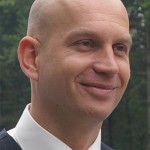Tobi Delbruck
 Tobi Delbruck is professor of physics and electrical engineering in the Inst. of Neuroinformatics (a joint institute of Univ. of Zurich and ETH Zurich), where he has been since 1998. He leads the Sensors group together with Shih-Chii Liu, which focuses on neuromorphic sensors and processing. He received his PhD from Caltech in 1993. He worked on electronic imaging at Arithmos, Synaptics, National Semiconductor, and Foveon. He has co-organized the Telluride Neuromorphic Cognition Engineering summer workshop and the live demonstration sessions at ISCAS and NIPS, and was formerly chair of the IEEE CAS Sensory Systems Technical Committee. He has been awarded 9 IEEE awards and is an IEEE Fellow.
Tobi Delbruck is professor of physics and electrical engineering in the Inst. of Neuroinformatics (a joint institute of Univ. of Zurich and ETH Zurich), where he has been since 1998. He leads the Sensors group together with Shih-Chii Liu, which focuses on neuromorphic sensors and processing. He received his PhD from Caltech in 1993. He worked on electronic imaging at Arithmos, Synaptics, National Semiconductor, and Foveon. He has co-organized the Telluride Neuromorphic Cognition Engineering summer workshop and the live demonstration sessions at ISCAS and NIPS, and was formerly chair of the IEEE CAS Sensory Systems Technical Committee. He has been awarded 9 IEEE awards and is an IEEE Fellow.
Plenary talk at EBCCSP:
This talk will be about our developments of asynchronous “silicon retina” vision sensors that offer the same form of spike event output as biological retinas. These neuromorphic sensors offer unique advantages for real-world vision problems in terms of latency, dynamic range, temporal resolution, and postprocessing cost. The talk will include live demonstrations of the sensor.
Maurice Heemels
 Maurice Heemels received the M.Sc. degree in mathematics and the Ph.D. degree in control theory (both summa cum laude) from the Eindhoven University of Technology (TU/e), Eindhoven, The Netherlands, in 1995 and 1999, respectively. After being an Assistant Professor at the Electrical Engineering department at TU/e and a research fellow at the Embedded Systems Institute (ESI), he is currently a Full Professor in the Control Systems Technology Group at the Mechanical Engineering department at TU/e. Maurice held visiting research positions at the Swiss Federal Institute of Technology (ETH), Zurich, Switzerland (2001), at Océ, Venlo, the Netherlands (2004) and at the University of California at Santa Barbara, USA (2008). He was awarded a prestigious VICI grant entitled “Wireless control systems: A new frontier in automation,” served/s on the editorial board of the journals “Automatica” and “Nonlinear Analysis: Hybrid Systems” and as general/IPC chair of IFAC ADHS 2012, IPC chair of IFAC NECSYS 2013 and IPC-co chair of ECC 2013 next to serving in numerous IPCs. His current research interests include control theory, hybrid and cyber-physical systems, networked, wireless and event-triggered control and constrained systems including model predictive control.
Maurice Heemels received the M.Sc. degree in mathematics and the Ph.D. degree in control theory (both summa cum laude) from the Eindhoven University of Technology (TU/e), Eindhoven, The Netherlands, in 1995 and 1999, respectively. After being an Assistant Professor at the Electrical Engineering department at TU/e and a research fellow at the Embedded Systems Institute (ESI), he is currently a Full Professor in the Control Systems Technology Group at the Mechanical Engineering department at TU/e. Maurice held visiting research positions at the Swiss Federal Institute of Technology (ETH), Zurich, Switzerland (2001), at Océ, Venlo, the Netherlands (2004) and at the University of California at Santa Barbara, USA (2008). He was awarded a prestigious VICI grant entitled “Wireless control systems: A new frontier in automation,” served/s on the editorial board of the journals “Automatica” and “Nonlinear Analysis: Hybrid Systems” and as general/IPC chair of IFAC ADHS 2012, IPC chair of IFAC NECSYS 2013 and IPC-co chair of ECC 2013 next to serving in numerous IPCs. His current research interests include control theory, hybrid and cyber-physical systems, networked, wireless and event-triggered control and constrained systems including model predictive control.
Jan Lunze
 Prof. Dr.-Ing. Jan Lunze is head of the Institute of Automation and Computer Control at Ruhr-University Bochum, Germany. His main research interests include networked control systems, fault-tolerant control, and hybrid dynamical systems. He has been the coordinator of the Priority Program 1305 on Control Theory of Digitally Networked Dynamic Systems between 2007 and 2014 of the German Research Foundation. He is author of numerous research papers, monographs and textbooks in control theory.
Prof. Dr.-Ing. Jan Lunze is head of the Institute of Automation and Computer Control at Ruhr-University Bochum, Germany. His main research interests include networked control systems, fault-tolerant control, and hybrid dynamical systems. He has been the coordinator of the Priority Program 1305 on Control Theory of Digitally Networked Dynamic Systems between 2007 and 2014 of the German Research Foundation. He is author of numerous research papers, monographs and textbooks in control theory.
Plenary talk at EBCCSP:
“Event-based of interconnected systems: theory and experimental evaluation”
Event-based control is a new control methodology where the sampler and the hold element of sampled-data control loops are replaced by an event generator or a control input generator, respectively. The aim of the new control configuration is to send information from the sensor nodes towards the actuator nodes only in situations where disturbances or model uncertainties have driven the plant away from the desired trajectory. The paper shows systematic ways of how to design the two new components and how to analyze the event-based control loops, and evaluates the methods by experimental results.